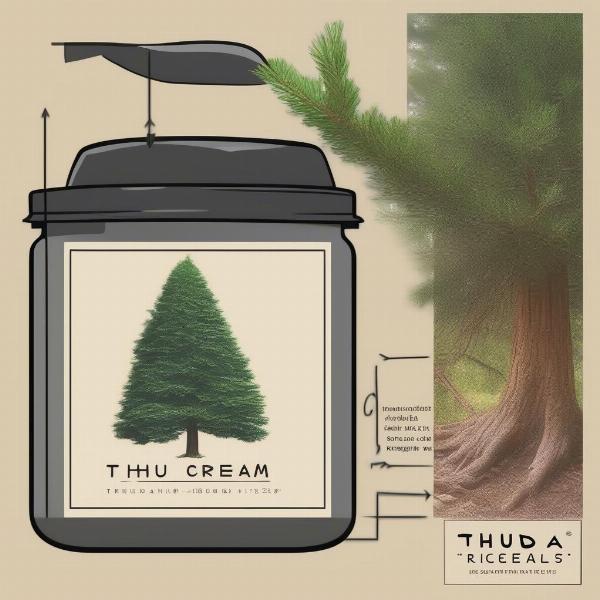Thuja cream for dogs is a topic shrouded in both interest and misinformation. While thuja itself has historical uses in herbal remedies, its application as a topical cream for canine health issues requires careful consideration. This comprehensive guide will delve into the facts about thuja cream, its potential benefits and risks for dogs, and provide you with the knowledge you need to make informed decisions regarding your pet’s well-being.
Understanding Thuja and Its Uses in Veterinary Medicine
Thuja, derived from the Thuja occidentalis tree (also known as Eastern White Cedar or Arborvitae), has been traditionally used in herbal medicine for various ailments. However, its efficacy and safety for veterinary use, especially as a topical cream, are not well-established. While some proponents claim benefits for skin conditions like warts and tumors, it’s crucial to understand the current scientific evidence, or lack thereof, surrounding these claims.
 Thuja Tree and Cream
Thuja Tree and Cream
Potential Benefits and Risks of Thuja Cream for Dogs
Some anecdotal evidence suggests thuja cream may have a positive effect on certain benign skin growths in dogs. However, there’s a significant lack of rigorous scientific studies to support these claims. Furthermore, thuja contains compounds called thujones, which can be toxic if ingested or absorbed in large amounts. This poses a particular risk for dogs who might lick the applied cream.
Is Thuja Cream Safe for All Dogs?
The safety profile of thuja cream for dogs is not fully understood. It’s crucial to consult with your veterinarian before using any thuja-based product on your dog. They can assess your dog’s individual health condition, consider potential interactions with other medications, and advise you on the appropriate course of action. Never self-treat your dog with thuja cream without professional guidance.
Alternatives to Thuja Cream for Canine Skin Conditions
Several proven and veterinarian-approved treatments exist for various canine skin conditions. These range from medications to surgical removal, depending on the specific issue. If your dog is experiencing any skin problems, it’s always best to consult your veterinarian for a proper diagnosis and treatment plan.
What to Do If Your Dog Licks Thuja Cream
If your dog ingests thuja cream, contact your veterinarian or a pet poison control center immediately. Thuja toxicity can manifest as various symptoms, including tremors, vomiting, and diarrhea. Prompt veterinary intervention is crucial to mitigate potential adverse effects.
Navigating Misinformation and Seeking Reliable Sources
The internet is rife with anecdotal information regarding thuja cream for dogs. It’s crucial to rely on evidence-based information from reputable sources like veterinary professionals and scientific studies. Be wary of unsubstantiated claims and always prioritize your dog’s safety.
Conclusion
While thuja cream might hold some allure for treating canine skin conditions, its use requires careful consideration and veterinary guidance. The potential risks associated with thuja, coupled with the lack of substantial scientific evidence supporting its benefits, necessitate caution. Always consult with your veterinarian before considering any alternative treatments for your dog’s health issues. Prioritizing your pet’s safety and well-being should always be your top concern.
FAQ
- Is thuja cream effective for treating warts in dogs? There is limited scientific evidence to support the effectiveness of thuja cream for treating warts in dogs.
- Can I use human thuja cream on my dog? No, it’s best to avoid using human thuja cream on dogs. Always consult your vet for appropriate treatment.
- What are the signs of thuja toxicity in dogs? Signs of thuja toxicity can include tremors, vomiting, diarrhea, and difficulty breathing.
- Are there any natural alternatives to thuja cream for dog skin issues? Yes, several natural remedies can be used for dog skin issues, but always consult your vet before trying any new treatment.
- Where can I find reliable information about dog health? Consult your veterinarian and reputable veterinary websites for reliable information about dog health.
- How can I prevent skin problems in my dog? A balanced diet, regular grooming, and parasite prevention are essential for maintaining healthy skin in dogs.
- What should I do if my dog has a skin growth? Consult your veterinarian for proper diagnosis and treatment.
ILM Dog is your trusted partner in canine care, providing expert advice and resources on dog breeds, health, training, nutrition, grooming, and much more. We are committed to offering evidence-based information to help you make the best decisions for your furry friend. For personalized advice and guidance, contact us at [email protected] or +44 20-3965-8624. Visit ILM Dog for more insightful articles and resources to support your dog’s well-being.